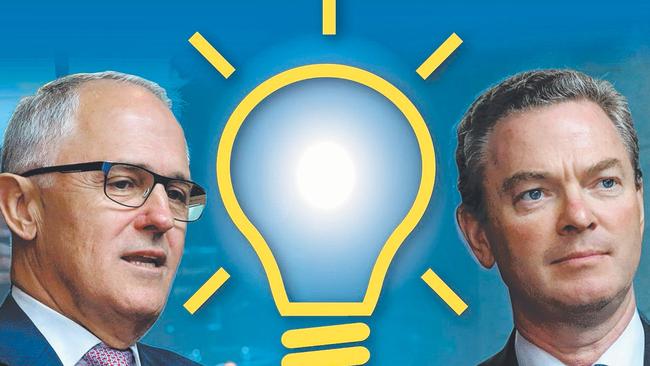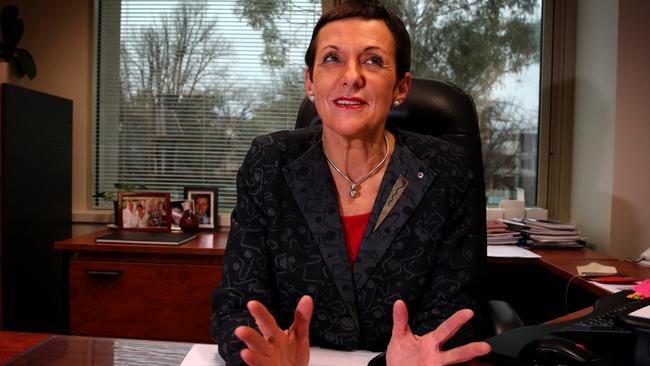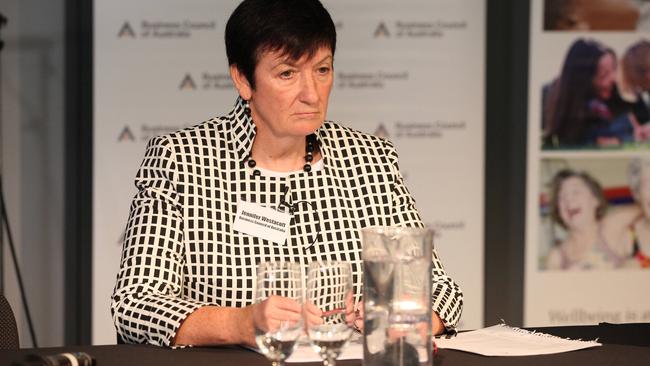Prime Minister’s ‘very good idea’ on innovation based on tired 20th century bureaucratic mindset
OH good grief! I’m from the government and am here to help you innovate, bemoans Terry McCrann.

Terry McCrann
Don't miss out on the headlines from Terry McCrann. Followed categories will be added to My News.
OH good grief! I’m from the government and am here to help you innovate.
The first thing to be said about “Malcolm Turnbull’s Innovation Statement” is exactly that. It is his; he owns it completely, both the hapless hopelessness of the specific initiatives (sic) and the tired 20th century left-of-centre bureaucratic mindset on which they are based.
For the last three months — for his first three as prime minister — Turnbull has been able to get away with the soothing reasonableness of “everything’s on the table; nothing’s been taken off”.
That is, apart from some specific and mostly popular decisions which were really just the delivery of decisions which had already been taken under his predecessor.
The great appeal of the Turnbull “no-decisions” approach is that not only weren’t there any losers yet, but many if not most could even believe they’d be one of the winners, when things were finally taken off or left on the table.
At some point that is going to have to be done. Turnbull (and his treasurer Scott Morrison) are going to have to either propose an increase in the GST or not; they are going to have to either propose cutting company and personal income tax or not; they are going to have to propose higher taxes on superannuation or not, and on who’s super.
That’s when the rubber will first hit the road; when we will first get a real reading in the opinion polls of what people think about a Turnbull government and a Turnbull PM.
We are of course still waiting for that. Yes, yesterday’s statement was a “Turnbull Policy” but one which was at the same time unthreatening and of absolutely no — positive — consequence.
That indeed is the best thing that can be said about it: that it’s irrelevant; that the government is only wasting $1 billion. This is though, a rather telling indicator of the big government mindset of the Turnbull Government, coming as it does after last week’s announcement it would throw away another $1 billion on climate change stupidity.

“A billion here, a billion there, and soon you are talking real money,” is a famous and pungent quote from one-time US senator Everett Dirksen.
It is fascinating to see that Turnbull seems to have taken that quote as an instruction manual rather than as criticism of the casual way governments waste taxpayer money.
Now true, Dirksen said it 50 years ago when even the smaller million was “seriously real money”; and in our $400 billion a-year budget spending scheme of thing, another $2 billion — and spread over four years — is neither here nor there.
But even if just (fiscal) “straws”, the two initiatives are still more straws on the taxpayer’s back.
Government spending this year will run at 25.9 per cent of GDP for the second successive year — all-but as high as the 26 per cent peak of the Rudd-Gillard years when all that money was splurged to save us from the GFC. Yes, the extra $2 billion (over four years) will hardly increase that, but goodness me, the PM should be announcing initiatives to CUT that spending, not increase it, even if marginally.
For a statement about policies supposedly to promote innovation, Turnbull’s statement was strikingly lacking in innovation.
Ask yourself: do you think the “usual policy suspects” of a few minor tax breaks, handing out more taxpayer money to the (now thoroughly climate change corrupted) CSIRO, various other research grants, a new “entrepreneurs visa”, and so-called “landing pads” in Silicon Valley, are going to birth the next Steve Jobs and let a thousand Apples bloom?
Well at least he’s trying, might be the response. No he’s not; he’s engaging in the classic political bureaucracy exercise of “looking for the lost key under the street-light not where it was dropped”.
You do that because “it’s easier”, — way easier than doing the hard things which would actually encourage innovation, like cutting the company tax to 20 per cent, and paying for it (not as much as you might think because it also reduces franking credits) by cutting government spending.
The Business Council’s response to the statement — politely — hinted at this. The best that CEO Jennifer Westacott could say was that the statement represented: “a significant step towards (my emphasis) recognising that there is a broader innovation system”.
What she really thought was captured in the next quote: that it was vital the statement’s initiatives were “complemented” by improvements to economy-wide policy settings, “including tax reform, the workplace relations system and the competition and deregulation agenda”.
That is to say, you want to give us policies to promote real and substantial innovation? Then give us these, not government handouts and piffling ones at that.

Even the more usually receptive — to handouts — Chamber of Commerce and Industry made exactly the same point. After the (similarly faint) praise from CEO Kate Carnell came: the “truth is” we need a “competitive tax system and strong industrial relations”. So, the best that can be said about the “innovation statement” is that it won’t waste too much money not innovating.
But there is something bad that can be said about it: that the supposed “bankruptcy reforms” would unleash the main-chancers and rip-off merchants to rip-off businesses.
What governments and their policy advisers never seem to learn is that if you offer a free lunch, many, many people — far more than they ever expect — line up to eat it.
The “free lunch” in this statement is the proposed reduction in the bankruptcy period from three years to one.
It’s supposed to help all those future “Steve Jobs” to try and fail and try again, and eventually create an Apple. Maybe, who knows.
But what it will most certainly do is to allow every spiv and rip-off merchant to go broke, costing creditors millions, and spring back in just one year and repeat the exercise.
Well, Malcolm, that’s certainly “innovative”.
NAB’S BIG WIN WIN
THE structure chosen by NAB to separate its British banks is best not only for NAB but for shareholders, separately from their shareholdings in NAB, as well.
Holders will get one share in ‘CYBG PLC’ for every four shares they hold in NAB. They don’t have to pay for them; in that sense they get them ‘free.’
That will deliver 75 per cent of CYBG.
The other 25 per cent will be sold to institutional investors. That will raise — some — cash for NAB; but more importantly establish an initial price for CYBG shares on the London Stock Exchange.
Theoretically a NAB holder should be no better — or worse off; that his or her four shares in the post-separation NAB plus one share in CYBG would be worth four pre-separation NAB shares.
More likely the new package will be worth slightly more, because a NAB freed from its British ball and chain shouldn’t drop in price by as much as the value of the assets (sic) it is losing. And holders can sell their CYBG shares or keep them as a punt.


